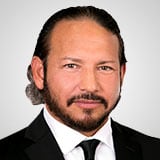One trait found among many successful companies is the quality of competitive advantage, or moat, explains Jim Woods, an exchange-traded fund expert and the editor of The Deep Woods.
This means that competing with these companies is difficult, whether due to significant barriers to entry in the industry or other factors such as important patents.
VanEck Morningstar Wide Moat ETF (MOAT) is an exchange-traded fund (ETF) that invests in an equal-weighted basket of U.S. companies determined by stock rater Morningstar to be among the “wide moat” companies with the highest fair values and subjective economic rating.
Year to date, this fund has struggled by dropping 20%. However, over a longer time frame, its performance follows a fundamentally upward trajectory, as its value doubled in a less than four-year span from mid-2018 to earlier this year — and its strategy may be more useful for long-term performance than short-term variation.
The ETF’s expense ratio of 0.47% is ordinary and easily more than paid for by its 1.37% dividend yield. Nearly $6 billion in net assets makes MOAT a relatively heavy hitter. Among the stocks owned by this fund are Biogen (BIIB), 3.47%; Etsy (ETSY), 2.98%; MercadoLibre (MELI), 2.92%; Gilead Sciences (GILD); and Wells Fargo & Co. (WFC), 2.83%.
Because the fund pursues an equal-weighting strategy, all 40 companies impact its performance roughly equally, though there can be some variation because the fund is rebalanced on a staggered quarterly basis.
For investors wo are interested in the strategy of investing in companies that are difficult to compete against, VanEck Morningstar Wide Moat ETF provides a diverse collection of 40 stocks based around that exact thesis.
Meanwhile, the VanEck Morningstar ESG Moat ETF (MOTE) tracks an equal-weighted index of U.S. stocks perceived to have high fair value, sustainable competitive advantage, positive momentum and excellent environmental, social and governance (ESG) ratings.
MOTE is a passively managed fund which tracks an index that provides exposure to U.S. stocks of any market-capitalization size that are deemed “wide moat” companies (attractively priced stocks that have sustainable competitive advantages) with low ESG risk.
The fund selects wide-moat companies using quantitative and qualitative factors while screening out those with severe or high ESG Risk Scores, as well as those viewed as controversial.
Eligible securities are then ranked by momentum to only include the top 80%. Each sector is capped at 10%. The index is equally weighted, divided into two equal sub-portfolios, which follow a staggered rebalance strategy. Half of the portfolio is rebalanced in June and the other in December.
As with any opportunity, potential investors should conduct their own due diligence in deciding whether these funds fit their own individual investing needs and portfolio goals.










